layout: true <div class="footer"><div class="flexcontainer"><span>.body[[https://pem-aachen.de](http://pem-aachen.de)]</span> <span>.center[C++ User Group Aachen 2018]</span><span>.body[© 2018 Markus Werle ([github](http://github.com/daixtrose) [linkedin](https://www.linkedin.com/in/markus-werle-04305a12a/))]</span></div></div> --- class: middle template: inverse .center[ # A Gentle Introduction to Ranges v3 .accent[ ### Say Goodbye to STL the Way You (Probably Don't) Know It Duration: 1:07:42 (#NoEstimates) ] ] --- layout: false # Hints .split-50[ .column[ - You can download this talk **and** code samples in the form of unit tests - https://github.com/daixtrose/gentle-intro-to-ranges - Published under MIT licence - Code for talk framework based on remark.js was stolen from [Kirk Shoop's Intro to RxCpp](https://github.com/kirkshoop/introductionToRxcpp) - Please contribute fixes or [file an issue](https://github.com/daixtrose/gentle-intro-to-ranges/issues) if you find errors or know about improvements. ] .column[  <br> <br> <br> <br> ] ] --- # Disclaimer .split-50[ .column[ - This is not "The Complete Guide", but - just a gentle **introduction** - a **user's view** (sic!) on ranges - focus is more on getting the basic ideas (tutorial) ] .column[  ] ] --- class: middle .center[ # Where do we come from? .accent[ ### Looking Back Over My Shoulder ] ] --- # Our Starting Point: STL .split-60[ .column[ - STL is the recommended **C++** way to deal with sets and operations on sets - Provides Containers - Provides Algorithms - Provides Utilities - STL is generic - STL makes no compromise: performance first - STl requires educated users > Hint: I am a great fan of the STL and encourage(d) its usage wherever possible. ] .column[ 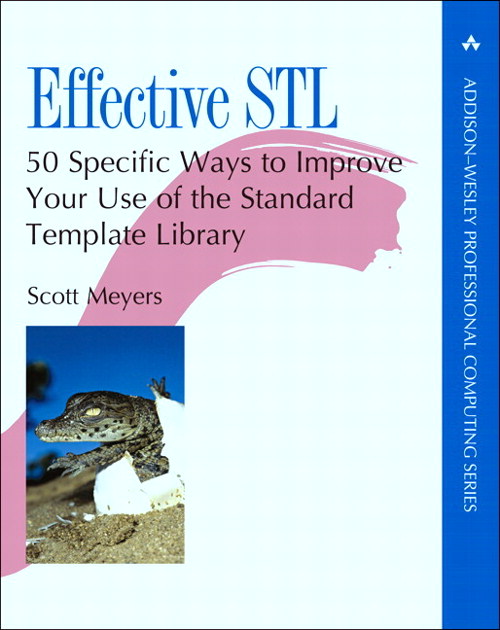 ] ] --- # STL Requires Educated Users .split-70[ .column[ **Example**: Scott Meyer's perfect version of a map search and update ```c++ typename std::map<double>::iterator lb = m.lower_bound(k); if (lb != m.end() && !(m.key_comp()(k, lb->first))) { lb->second = v; return lb; } else { typedef typename std::map<double>::value_type MVT; return m.insert(lb, MVT(k, v)); } ``` ] .column[  <br> <br> <br> <br> <br> <br> <br> ] ] --- class: middle .center[ # A Short History of C++ Ranges .accent[ ### As always incompl and written by the winners ] ] --- # STL: The Crisis Andrei Alexandrescu: ["Iterators Must Go" (2009)](https://accu.org/content/conf2009/AndreiAlexandrescu_iterators-must-go.pdf), Video [here](https://archive.org/details/AndreiAlexandrescuKeynoteBoostcon2009) ## TL;DR: - STL was built using a rigorous fundamental, academic, generic approach, but - leads to counter-intuitive rules in some places - is hard to learn (and hard to remember) - Working with data streams is a mess. - Algorithms are NOT **composable**. - Iterators - are so complex, one needs 10 years of education and/or - library help like [Boost.Iterator](https://www.boost.org/doc/libs/1_67_0/libs/iterator/doc/index.html) in order to get things right. --- # Ranges - Many attempts/proposals, e.g. - [Boost.Range](https://www.boost.org/doc/libs/1_67_0/libs/range/doc/html/index.html) Version 1 and 2 - Eric Niebler: 3 (!) versions > The rest of the talk deliberately ignores all other attempts > and gives an introduction to Eric Niebler's [ranges-v3](https://github.com/ericniebler/range-v3) for C++11/14/17 --- # Eric Niebler's Range-v3 - GitHub Repository at https://github.com/ericniebler/range-v3 - ISO Standard Proposal - https://ericniebler.github.io/std/wg21/D4128.html - TS: https://www.iso.org/obp/ui/#iso:std:iso-iec:ts:21425:ed-1:v1:en - http://www.open-std.org/jtc1/sc22/wg21/docs/papers/2017/n4651.pdf - [Explanations about iterators and why we need a sentinel](http://ericniebler.com/2015/02/03/iterators-plus-plus-part-1/) - [Merging the Ranges TS](http://www.open-std.org/jtc1/sc22/wg21/docs/papers/2018/p0896r1.pdf) (proposes to merge the Ranges TS into the working draft) .split-50[ .column[ ### October 2014 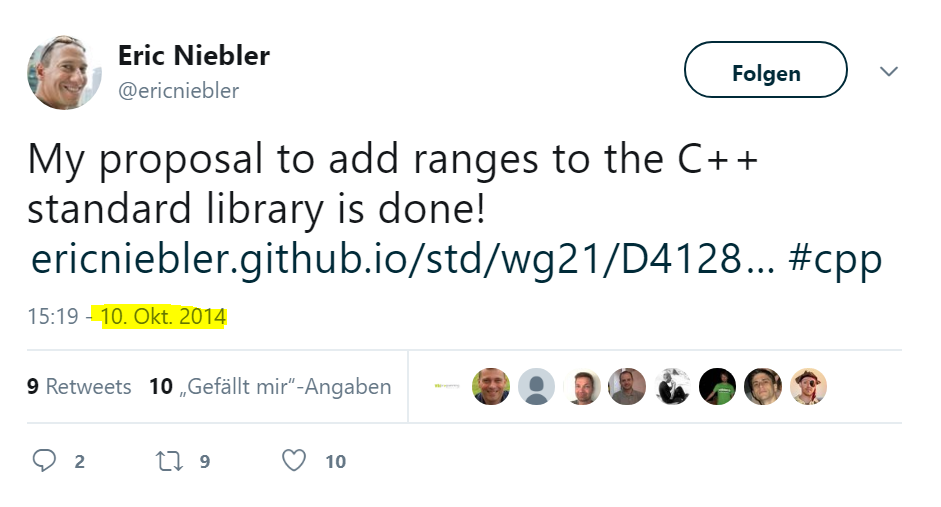 ] .column[ ### December 2017  ] ] --- class: middle .center[ # What are Ranges? .accent[ ### That's simple, isn't it? ] ] --- # What are Ranges? 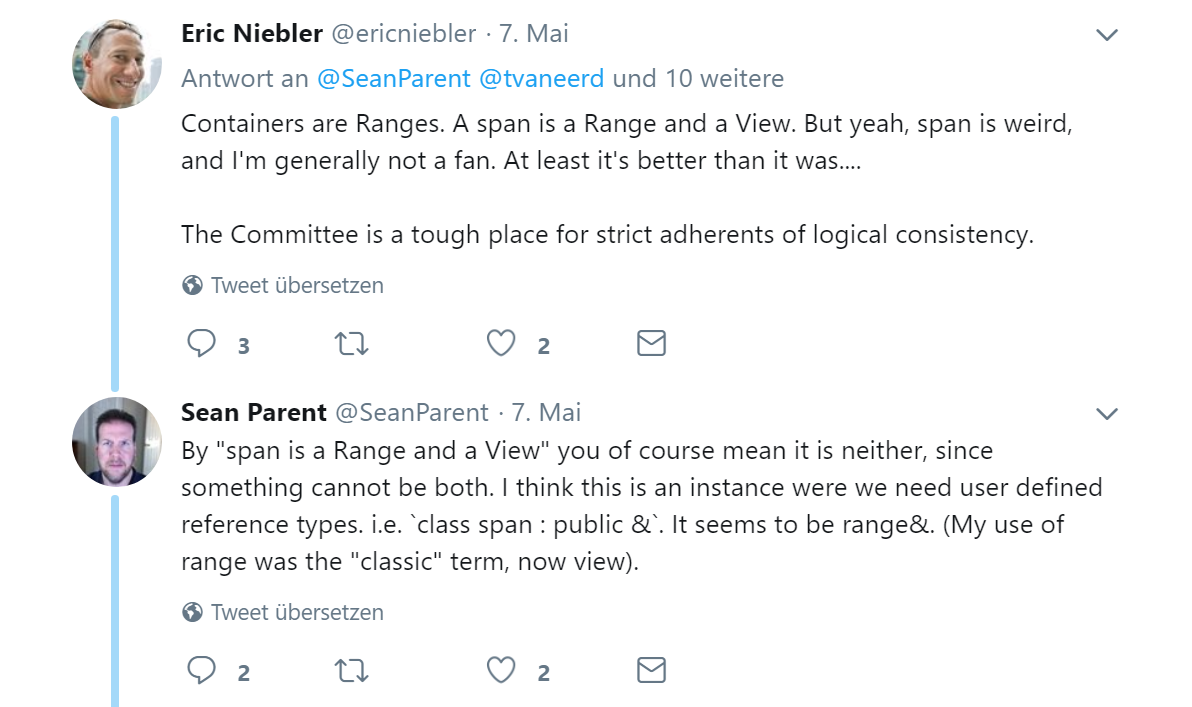 --- # What are Ranges? 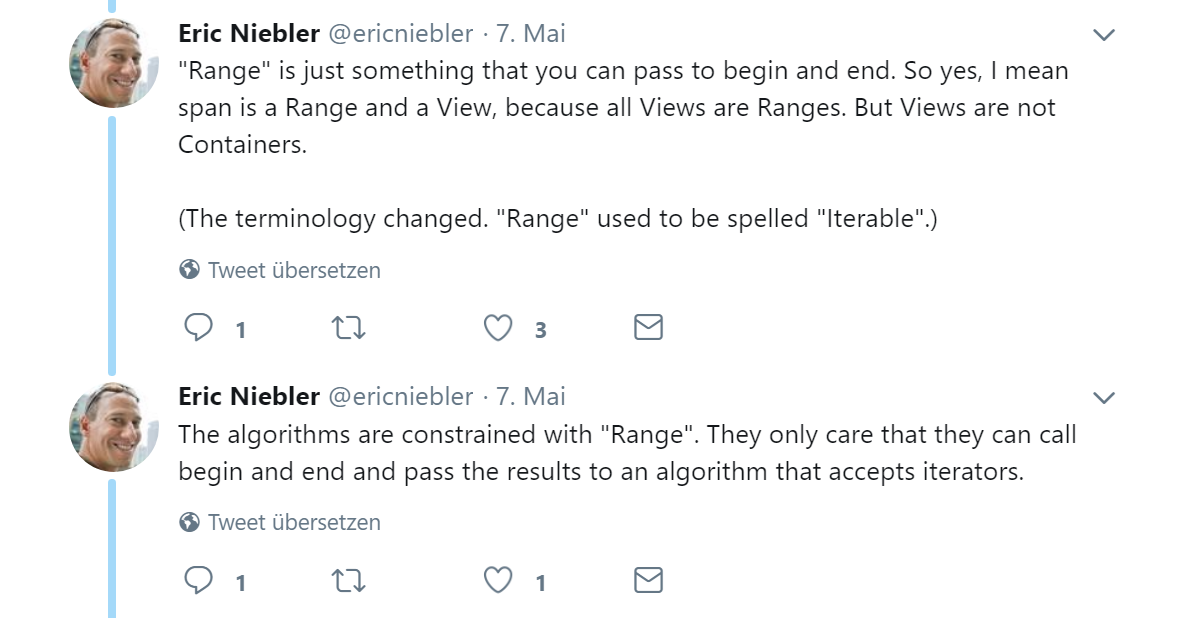 --- # What are Ranges? 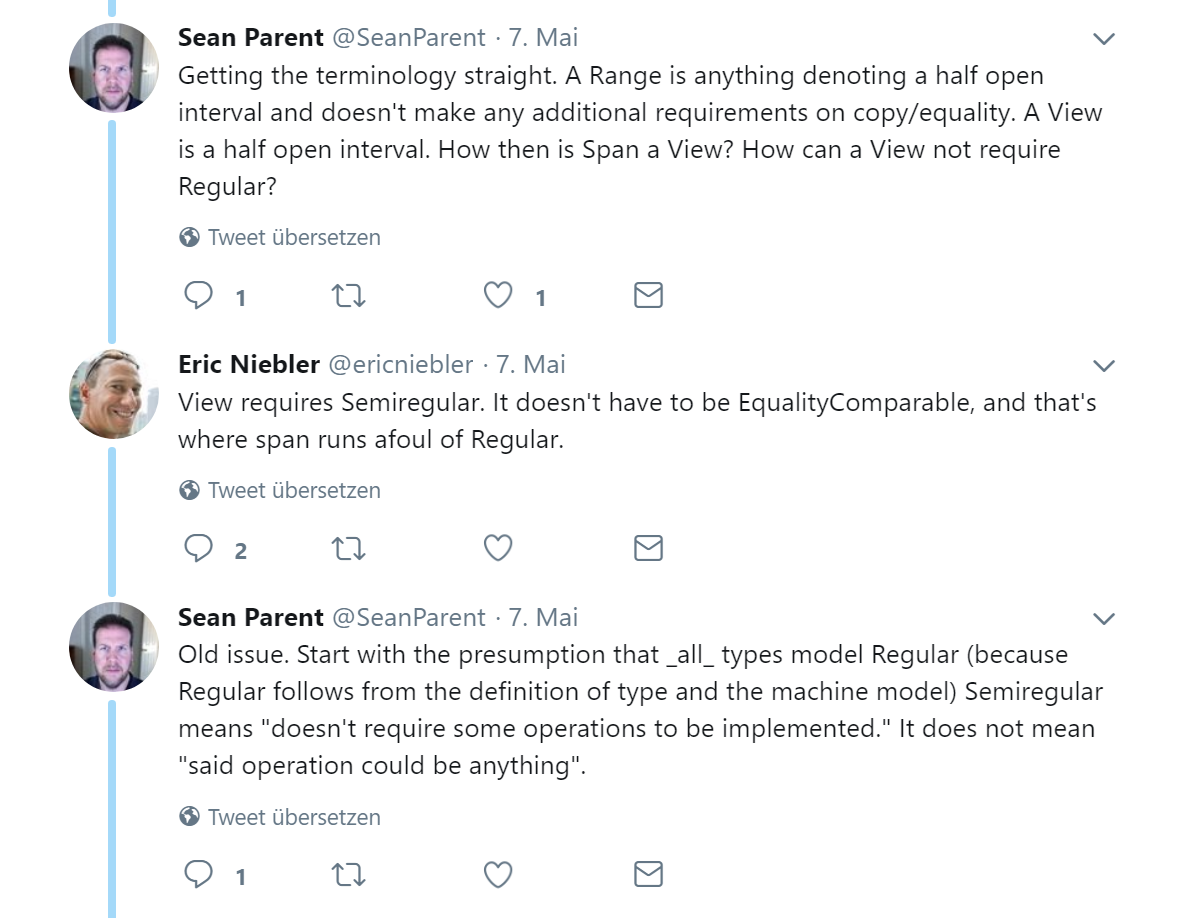 --- # What are Ranges? ```text ¯\_(ツ)_/¯ ¯\_(ツ)_/¯ ¯\_(ツ)_/¯ ¯\_(ツ)_/¯ ¯\_(ツ)_/¯ ¯\_(ツ)_/¯ ¯\_(ツ)_/¯ ¯\_(ツ)_/¯ ¯\_(ツ)_/¯ ¯\_(ツ)_/¯ ¯\_(ツ)_/¯ ¯\_(ツ)_/¯ ¯\_(ツ)_/¯ ¯\_(ツ)_/¯ ¯\_(ツ)_/¯ ¯\_(ツ)_/¯ ¯\_(ツ)_/¯ ¯\_(ツ)_/¯ ¯\_(ツ)_/¯ ¯\_(ツ)_/¯ ¯\_(ツ)_/¯ ¯\_(ツ)_/¯ ¯\_(ツ)_/¯ ¯\_(ツ)_/¯ ¯\_(ツ)_/¯ ``` --- # What are Ranges? > The C++ Ranges library is C#'s **LINQ** for C++ - Markus Werle Ranges in C++ are what `IEnumerable<T>` is in C#. That's why they were also called Iterables. C# is a language I struggled with many times because of its unnecessary limitations due to bad language design (esp. generics are multiple inheritance) and its limited expressiveness, but .split-50[ .column[ ### C# got some things right - Lambdas - Concurrency esp. `async/await` (see Steven Toub's [Concurrency in C# Cookbook](https://www.amazon.com/Concurrency-Cookbook-Asynchronous-Multithreaded-Programming/dp/1449367569)) and `CancellationToken`<br> - LINQ (`*this` talk) - Reactive Extensions (`*this->next()` talk) ] .column[ ### C++ gotta catch up - C++17's **generic** lambdas .image-fixed-20[] - `std::async` flawed, but concurrency will evolve (I see a bright `<future>` here, with `coroutines` and more confusion) - Ranges converge soon into ISO C++ .image-fixed-20[] - RxCpp will converge during the next years ] ] --- # What are Ranges? > C++ Ranges are **Pure Monadic Goodness** - [Bartosz Milewski](https://bartoszmilewski.com/2014/10/17/c-ranges-are-pure-monadic-goodness/) - **Functional Programming** curiously recurring all the time - Milewski: A **monad** is an applicative functor with an additional ability, which can be expressed either as a way of flattening a doubly encapsulated object, or as a way of applying a functor factory to an encapsulated object. - Simply said, it's all about - functions/algorithms (operations on values or sets of values) - composition of functions - programming without side effects (helps a lot when dealing with concurrency) --- # What are Ranges? > Ranges are a contribution to making C++ easier to write and reason about --- class: middle .center[ # Ranges by Example .accent[ ### To code or not to code, that is the question. ] ] --- # STL vs. Ranges: Transform (LINQ: Select, J*: Map) .split-50[ .column[ ### STL Approach ```c++ typedef /* ... ? ... */ result_t; std::vector<result_t> bar; std::transform ( `std::begin(foo)`, `std::end(foo)`, `std::back_inserter(bar)`, [](auto const v) { return 2 * v; }); ``` ] .column[ ### Ranges Approach ```c++ // bar is `lazy` and `composable` auto bar = foo `|` view::transform( [](auto const v) { return 2 * v; }); ``` ] ] --- # STL vs. Ranges: Composition ```c++ auto timesTwo = [](auto const v) { return 2 * v; }; auto plusTen = [](auto const v) { return v + 10; }; ``` .split-50[ .column[ ### STL Approach ```c++ auto composition = [=](auto v) { return plusTen(timesTwo(v)); }); std::transform ( std::begin(foo), std::end(foo), std::back_inserter(bar), composition); ``` ] .column[ ### Ranges Approach ```c++ // Remember: `lazy`, // i.e. optimizer looks through auto bar = foo | view::transform(timesTwo) | view::transform(plusTen) ; ``` ] ] --- # STL vs. Ranges: Composition ```c++ auto timesTwo = [](auto const v) { return 2 * v; }); auto plusTen = [](auto const v) { return v + 10.0; }); ``` .split-50[ .column[ ### STL Approach ```c++ auto composition = [](auto v) { return plusTen(timesTwo(v)); }); std::transform ( std::begin(foo), std::end(foo), std::back_inserter(bar), composition); ``` ] .column[ ### Ranges Approach (Composition to the Max) ```c++ // Remember: `lazy`, // i.e. optimizer looks through auto bar = foo | view::transform(timesTwo); auto baz = bar | view::transform(plusTen); ``` ] ] --- # Switching back to STL .split-50[ .column[ ### Explicit ```c++ auto bar = foo | view::transform(timesTwo) `| to_vector` ; ``` ```c++ auto bar = /* ... * / | `to_`<std::list>(); ``` ```c++ auto bar = /* ... * / | to_<std::vector<`long`>>(); ``` ] .column[ ### Implicit ```c++ std::vector<result_t> bar = foo | view::transform(timesTwo) ; ``` ```c++ std::list<result_t> bar = /* ... * / ; ``` ```c++ std::vector<long> bar = /* ... * / ; ``` ]] --- # Switching back to STL with Optimal Runtime Performance Citation from [Casey Carter's Answer on Stack Overflow](https://stackoverflow.com/questions/47831026/replacing-data-with-range-v3): ```c++ auto b = a | ranges::view::transform(complexFun) | ranges::to_vector; ``` If you already have a destination vector whose capacity you want to reuse: ```c++ b.clear(); // Assuming b already contains junk b `|=` ranges::action::push_back(a | ranges::view::transform(complexFun)); ``` > In both cases, `range-v3` is smart enough to reserve capacity in the destination vector for > `ranges::size(a | ranges::view::transform(complexFun))` elements to avoid copies due to reallocation. --- # Dual Interface: Chainable Pipe Operator vs. Regular Function Call For most algorithms there exist two `ranges-v3` interfaces: .split-50[ .column[ ```c++ auto bar = foo `|` view::transform(fn); ``` ] .column[ ```c++ auto bar = transform(foo, fn); ``` ]] <br> Some algorithms are not available in the pipe (`|`) form: ```c++ // std::copy(std::begin(v), std::end(v), // std::ostream_iterator<int>(std::cout, ' ')); ranges::copy(v, ranges::ostream_iterator<int>(std::cout, ' ')); ``` --- # Make a Range out of a Container ```c++ std::vector<double> v; auto rng = ranges::view::`all`(v); ``` This is useful e.g. for DEBUG output: ```c++ std::vector<double> v; std::cerr << `(` v | ranges::view::`all` `)` << std::endl; ``` --- # Group_By (LINQ: GroupBy) and Join (LINQ: SelectMany) ```c++ struct Person { std::string firstname; std::string surname; int year; }; std::ostream & operator<<(std::ostream & os, Person const & person) { os << person.surname << ", " << person.firstname << " was born in " << person.year; return os; } std::vector<Person> people{ { "Jared", "Kushner", 1981 }, { "Melania", "Trump", 1970 }, { "Donald", "Trump", 1946 }, { "Ivana", "Trump", 1949 }, }; ``` --- # Group_By (LINQ: GroupBy) ```c++ auto surname_is_equal = [](auto const & p1, auto const & p2) { return p1.surname == p2.surname; }; auto groups = people | ranges::view::`group_by`(surname_is_equal); for (auto const & group : groups) { std::cout << "-------\n"; copy(group, ostream_iterator<Person>(std::cout, "\n")); } ``` ``` ------- Kushner, Jared was born in 1981 ------- Trump, Melania was born in 1970 Trump, Donald was born in 1946 Trump, Ivana was born in 1949 ``` --- # Join (LINQ: SelectMany) ```c++ auto is_younger = [](auto const & p1, auto const & p2) { return p2.year < p1.year; }; auto each_group_sorted_by_age = groups | transform([`=`](auto g) { `sort`(g, is_younger); // range-v3/issues/266: no view::sorted return /* expensive copy of */ g; }); copy(`join`(each_group_sorted_by_age), ostream_iterator<Person>(std::cout, "\n")); ``` ``` --> sorted by age, then joined: Kushner, Jared was born in 1981 Trump, Melania was born in 1970 Trump, Ivana was born in 1949 Trump, Donald was born in 1946 ``` --- # Filtering - By Hand Using Yield_If (C#: Yield) ```c++ std::vector<int> numbers{1, 2, 3, 4, 5, 6}; auto is_odd = [](int i) { return i % 2 != 0; }; using ranges::view::for_each; using ranges::yield_if; // odd_numbers is a *lazy* expression, i.e. is_odd // will NOT be called in next statement auto odd_numbers = `for_each`(numbers, [=](int i) { return `yield_if`(is_odd(i), i); }); // now that the expression gets evaluated, is_odd will be called REQUIRE(ranges::equal(odd_numbers, std::vector<int>{1, 3, 5})); ``` --- # Filtering with Filter and Remove_If (LINQ: Where) ```c++ std::vector<int> numbers{1, 2, 3, 4, 5, 6}; using ranges::view::filter; // ambiguous, but meant positive. using ranges::view::remove_if; using ranges::not_fn; auto is_odd = [](int i) { return i % 2 != 0; }; auto odd_numbers = numbers | `filter`(is_odd); auto odd_numbers_alt = numbers | `remove_if`(`not_fn`(is_odd)); auto even_numbers = numbers | `remove_if`(is_odd); ``` --- # Set Operations ## Unique (LINQ: Distinct) Removes duplicate values from a collection. In most libraries, finding duplicates requires a sorted container/enumerable. Same here: ```c++ std::vector<int> numbers{3, 1, 2, 3, 3, 4, 3, 5, 6}; using ranges::action::unique; using ranges::action::sort; numbers |= `sort | unique`; REQUIRE(equal(numbers, std::vector<int>{1, 2, 3, 4, 5, 6})); // Instead of in-place treatment you can always explicitly request a copy auto numbers_sorted_and_unique = `numbers | copy` | sort | unique; ``` --- # Set Operations ## Set Difference (LINQ: Except) Returns the set difference, which means the elements of one collection that do not appear in a second collection. ```c++ std::vector<int> v1{1, 2, 3, 4}; std::vector<int> v2{3, 4, 5}; using ranges::view::set_difference; auto v = set_difference(v1, v2); using ranges::equal; REQUIRE(equal(v, std::vector<int>{1, 2})); ``` --- # Set Operations ## Symmetric Set Difference The symmetric difference finds the elements that are found in either of the ranges, but not in both of them ```c++ std::vector<int> v1{1, 2, 3, 4}; std::vector<int> v2{3, 4, 5}; using ranges::view::set_symmetric_difference; auto v = set_symmetric_difference(v1, v2); using ranges::equal; REQUIRE(equal(v, std::vector<int>{1, 2, 5})); ``` --- # Set Operations ## Set Intersection (LINQ: Intersect) Returns the set intersection, which means elements that appear in each of two collections. ```c++ std::vector<int> v1{1, 2, 3, 4}; std::vector<int> v2{3, 4, 5}; using ranges::view::set_intersection; auto v = set_intersection(v1, v2); using ranges::equal; REQUIRE(equal(v, std::vector<int>{3, 4})); ``` --- # Set Operations ## Set Union (LINQ: Union) Returns the set union, which means unique elements that appear in either of two collections. ```c++ std::vector<int> v1{1, 2, 3, 4}; std::vector<int> v2{3, 4, 5}; using ranges::view::set_union; auto v = set_union(v1, v2); using ranges::equal; REQUIRE(equal(v, std::vector<int>{1, 2, 3, 4, 5})); ``` --- # Partitioning ## Skip ```c++ // 'skip' is called 'drop' here auto result = numbers | drop(3); auto result = numbers | drop_exactly(3); auto result = numbers | drop_while([](int i) { return i < 4; }); ``` ## Take ```c++ auto result = numbers | take(3); auto result = numbers | take_exactly(3); auto result = numbers | take_while([](int i) { return i < 4; }); ``` --- # Generating Sequences ## Empty C# has `IEnumerable.Empty` (the neutral element of addition). AFAIK ranges-v3 does not contain such a feature. --- # Generating Sequences ## A Range of Numbers Stolen from https://github.com/ericniebler/range-v3/blob/master/test/view/iota.cpp ```c++ view::ints | view::take(10) // -> {0,1,2,3,4,5,6,7,8,9} view::ints(0) | view::take(10) // -> {0,1,2,3,4,5,6,7,8,9} view::ints(0,9) // -> {0,1,2,3,4,5,6,7,8} view::closed_indices(0,9) // -> {0,1,2,3,4,5,6,7,8,9} // l a z y auto chars = view::ints(std::numeric_limits<char>::min(), std::numeric_limits<char>::max()); ``` --- # Generating Sequences ## Generate ```c++ using ranges::view::generate; using ranges::view::take; auto rng = `generate`([`=`]() { // ... arbitrary calculation with side effects ... return result; }); auto sequence = rng | take(10); ``` --- # Generating Sequences ## Repeat ```c++ using ranges::view::repeat; // i.e. repeat `forever` using ranges::view::take; // {9, 9, 9, 9, 9, 9, 9, 9, 9, 9} auto rng = view::repeat(9) | view::take(10); ``` --- # Accessing elements ## At ```c++ std::vector<int> vi{1,2,3,4}; CHECK(ranges::index(vi, 0) == 1); CHECK(ranges::index(vi, 1) == 2); // etc. CHECK(ranges::at(vi, 0) == 1); CHECK(ranges::at(vi, 1) == 2); // etc. // Does not compile if random access iterator not available // std::list<int> li{1,2,3,4}; // auto rng = li | ranges::view::all; // CHECK(ranges::at(li, 0) == 1); ``` --- # Accessing elements ## First / First or Default `AFAIK n.a.` probably use `*begin(rng)` ## Last / Last or Default `AFAIK n.a.` probably use `*begin(rng | reverse)` ## Single `AFAIK n.a.` --- # Maps Extract the values from a dictionary ```c++ std::map<int, std::wstring> m = { {1, L"1"}, {2, L"2"}, {3, L"3"} }; auto keys = m | ranges::view::reverse | ranges::view::keys; auto vals = m | ranges::view::reverse | ranges::view::values; ``` --- class: middle .center[ # Real World Examples .accent[ ### Ranges in Action ] ] --- # What are Ranges? > Ranges are a contribution to making C++ easier to write and reason about. ```c++ auto filteredAndInCartesianCoordinates = coordinates | remove_if(outsideOfReasonableRange) | remove_if(is_inf_or_nan) | transform(polarToCartesian) | reverse; ``` --- ```c++ std::vector<PolarCoordinate> selectNearestSegmentToAngleZero( std::vector<std::vector<PolarCoordinate>> const& segments) { // ... using declaratives omitted ... auto average_angle = [](auto&& coordinates) { auto angles = coordinates | `transform`([](auto pc) { return pc.angle; }); auto sumOfAngles = `accumulate`(angles, 0.0); auto result = sumOfAngles / static_cast<double>(`size`(coordinates)); return result; }; auto averageValuesAbs = segments | `transform`(average_angle) // yields a range of average values | `transform`([](auto v) { return std::abs(v); }); auto index = `distance`(averageValuesAbs.begin(), `min_element`(averageValuesAbs)); return segments[index]; } ``` --- class: middle .center[ # How I lost my reputation .accent[ ### Si tacuisses, philosophus mansisses ] ] --- ## How I lost my reputation ```c++ std::vector<std::vector<PolarCoordinate>> segments; // ---------------------------- Variant 1 ---------------------------------- std::vector<PolarCoordinate> firstSegmentReversed = segments[0] | `transform`(polarToCartesian) | `reverse`; for (auto const& point : firstSegmentReversed) { std::cerr << point.first << ", " << point.second << std::endl; } // ---------------------------- Variant 2 ---------------------------------- auto segmentsReversedViaNestedTransform = segments | `transform`([](auto s) { return s | `transform`(polarToCartesian) | `reverse`; }); for (auto const& point : `*begin`(segmentsReversedViaNestedTransform)) { std::cerr << point.first << ", " << point.second << std::endl; } ``` --- ## How I lost my reputation ```c++ std::vector<std::vector<PolarCoordinate>> segments; std::vector<PolarCoordinate> firstSegmentReversed = segments[0] | `transform`(polarToCartesian) | `reverse`; for (auto const& point : firstSegmentReversed) { std::cerr << point.first << ", " << point.second << std::endl; } ``` yields ``` 2.0944, 29.96 2.08567, 29.96 2.07694, 29.96 2.06821, 29.96 2.05949, 29.96 ``` --- ## How I lost my reputation ```c++ auto segmentsReversedViaNestedTransform = segments | transform([](auto s) { return s | transform(polarToCartesian) | reverse; }); for (auto const& point : *begin(segmentsReversedViaNestedTransform)) { std::cerr << point.first << ", " << point.second << std::endl; } ``` yields ``` 2.0944, 29.96 2.08567, 29.96 2.07694, 29.96 2.06821, 29.96 0, 29.96 <------ SOMETHING WRONG ``` --- ## How I lost my reputation ```c++ std::vector<std::vector<PolarCoordinate>> segments; auto broken_stuff = segments | transform([](auto s) { return s | transform(polarToCartesian) | reverse; }); ``` Explanation by [@gnzlbg](https://github.com/gnzlbg): > `[](auto s) { return s | reverse; }` creates a **dangling view**. > The inner vector will be copied into the `s` argument (the lambda stack frame), > and `| reverse` creates a view (that is, a pair of pointers) into this local vector. > The problem is that this vector will be destroyed on scope exit (freeing the memory), > so when the view is returned its pair of pointers into the vector will point > into freed memory. > > When you try to iterate the view, you are basically dereferencing these pointers, > and that is undefined behavior: read after free. --- ## How I lost my reputation ```c++ std::vector<std::vector<PolarCoordinate>> segments; auto segmentsInCartesianCoordinates = segments | transform([](auto`&&` s) { return s | transform(polarToCartesian) | reverse; }); ``` --- # Dangling References due to Views ```c++ auto doub = [](int i) -> int { return 2 * i; }; int main() { auto e = find_if( view::ints(1) | view::transform(doub), is_six ); cout << "find-six: " << *e.get_unsafe() << endl; } ``` Prefer this version: ```c++ auto doub = [](int i) -> int { return 2 * i; }; int main() { auto candidates = view::ints(1) | view::transform(doub); auto e = find_if( candidates, is_six ); cout << "find-six: " << *e << endl; } ``` --- class: middle .center[ # Closing Remarks .accent[ ### The end is near. ] ] --- # Not in this Talk (Same Semantic as STL) ``` adjacent_find, all_of, any_of, binary_search, copy, copy_backward, copy_if, copy_n, count, count_if, equal, equal_range, fill, fill_n, find, find_end, find_first_of, find_if, find_if_not, for_each, for_each_n, generate, generate_n, heap_algorithm, inplace_merge, is_partitioned, is_sorted, is_sorted_until, lexicographical_compare, lower_bound, max, max_element, merge, min, min_element, minmax, minmax_element, mismatch, move, move_backward, none_of, nth_element, partial_sort, partial_sort_copy, partition, partition_copy, partition_point, permutation, remove, remove_copy, remove_copy_if, remove_if, replace, replace_copy, replace_copy_if, replace_if, reverse, reverse_copy, rotate, rotate_copy, sample, search, search_n, set_algorithm, shuffle, sort, stable_partition, stable_sort, swap_ranges, tagspec, transform, unique, unique_copy, upper_bound ``` --- # There's more to come. > I see a great `std::future<std::ranges>` for `C++`. ## Next talk .accent[ ### Reactive Extensions: Ranges for Values Distributed in Time ] --- class: middle template: inverse .center[ # Thank You for Your Attention .accent[ ### (and welcome to modern C++) ] ]